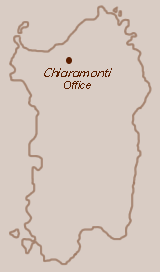Buying Guide - Sardinia, Italy
STAGE 1
PROPOSTA DI ACQUISTO - (OFFER TO PURCHASE)
Having identified the property you wish to purchase and agreed the price you wish to offer, with us the Agency, you will be required to sign a PROPOSTA DI A'CQUISTO (PROPOSAL TO PURCHASE). This is a reservation agreement, normally valid for a few weeks. A small deposit is required at this stage from the Buyer (between 1000 euros and 3000 euros depending on the value of the property). This deposit is only handed over to the Vendor when they have agreed the price formally and have countersigned the Proposal. The property is then withdrawn from the market by the Vendor, and the deposit becomes non-refundable should the Buyer fail to complete the purchase.
STAGE 2
COMPROMESSO - (PRELIMINARY CONTRACT)
Once your offer has been accepted by the Vendor, then both parties can sign the COMPROMESSO (Preliminary Contract), which is a legally binding agreement, whereby both parties have the mutual obligation to complete the purchase. At this point the Buyer must pay a deposit ( ranging from 10% to 20% of the sale price) to the Vendor. Once the deposit for the Preliminary Contract has been handed over, it is not refundable. For example, if the Buyer withdraws he will lose his deposit.
In the process of drawing up the Preliminary Contract, the buyer(s) will require a tax code, which in Italy is a tax identification number (Codice Fiscale). In the Preliminary Contract the following documents are included:
• Plan of the house
• Habitable Condition
• Planning Permissions
PLEASE NOTE THAT IN PRACTICE THE ABOVE STAGE IS OFTEN SKIPPED IN FAVOUR OF A DIRECT PROCESS TO STAGE 3 to avoid unnecessary expense and time.
STAGE 3
ROGITO - (TITLE)
The final step is the execution of the ROGITO (Title Deed ). This contract has to be signed in the presence of a public Notaio (Notary ). The Notary is an independent and impartial officer who performs the vital task of registering the sale in the Land Register. This act publicly records the transfer of the ownership to the buyer. The Notary also ensures that the sale is executed correctly by running local searches in the Land Register, checking planning permission, investigating the vendor's legal title, and checking that no other mortgage or charge exists over the property. At this stage the buyer pays to the Notary the balance of the price for purchasing the property, the Notary fees (usually ranging between 2.5% to 3% of the property value), and the taxes payable (10% for a second home, or 4% if primary residence). The buyer's commission of 3% must also be paid to the Agency at this stage. Translation of the deed, which is required by law, is included in the fee.
OUR SERVICES.
Here are some of the services offered by KEY TO SARDINIA:
• We will meet you at the airport, at your hotel ,or our office
• Assistance with opening an Italian Bank Account
• Assistance with Italian mortgage lenders
• Assistance with acquiring a tax identification number (Codice Fiscale)
• Assisting clients in re-selling the property
• Translation of the Deed, or providing a translator at the execution of the Deed, at cost price.
• Key To Sardinia will support you throughout the entire buying process, and answer any questions you may have, and will continue to be your first point of contact until you are in your new property.
EXTRA SERVICES - KEY TO SARDINIA also offers the following services for which there are pre-agreed charges:
• Introduction to and assistance with the formulation of estimates from builders,electricians, plumbers, carpenters and other relevant tradesmen.
• Assistance with the registration of your property for the supply of water, electricity and other utilities.
• Introduction to and assistance in discussions with local suppliers of bathroom, kitchen and other equipment, including tiles, appliances, furniture etc.
• KEY TO SARDINIA also offers an in-house project-management service to oversee all aspects of the renovation of your property to pre-agreed specifications, thereby providing you with a "turn-key" home.
THE PRICES QUOTED BY KEY TO SARDINIA FOR ALL PROPERTIES FOR SALE IN SARDINIA ARE SUBJECT TO a 3% BUYERS COMMISSION unless stated otherwise.






